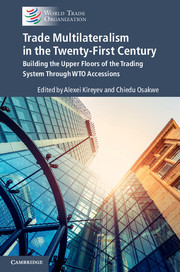 Trade Multilateralism in the Twenty-First Century
Trade Multilateralism in the Twenty-First Century from PART III - Accessions Acquis: Thematic Perspectives and Implementation Challenges
Published online by Cambridge University Press: 28 November 2017
Abstract
Although the private sector is not, in most cases, directly involved in negotiations for accession to the World Trade Organization (WTO), its needs and positions are addressed through consultative mechanisms organized at the national level by WTO members. These mechanisms represent a two-way information channel: the relevant authorities can obtain the foundations to formulate and defend national negotiating positions, while the private sector has an avenue to present sectoral interests as well as any relevant trade concerns. In acknowledging the influence of the private sector, the objective of this chapter is to examine the existing public-private consultation mechanisms in selected WTO members, as well as the evidence of private sector interests in recent reports of accession working parties. The analysis suggests that the influence of the business sector is embedded in accession protocols. Accession agreements include results obtained through trade policy consultation mechanisms, which vary in the degree of formality and sophistication. Ideally, the consultation and outreach mechanisms established by acceding governments to promote support for WTO accession should be strengthened throughout the WTO membership. Such mechanisms should continue to function once accessions have been completed to support the implementation of commitments, set further negotiating priorities and participate in trade policy reviews and dispute settlement. The support and contributions of the private sector were instrumental to successfully achieve recent multilateral results, notably the Trade Facilitation Agreement and the expansion of the Information Technology Agreement.
Acceding governments have recognized the central role that joining the WTO plays in cementing domestic reforms and improving the business and investment environment. For instance, officials from Kazakhstan stated that the ‘main goal of WTO accession is improving the country's investment climate’ (Turebekova, 2015). At the same time, exporters, importers and investors are continuously scouting for new business opportunities. Recently acceded members (i.e. members that have joined the WTO as per the procedures contained in Article XII of the Marrakesh Agreement Establishing the World Trade Organization, or WTO Agreement) represent tangible market access opportunities for goods and services, based on the commitments reflected in their respective schedules and their working party reports.
To save this book to your Kindle, first ensure [email protected] is added to your Approved Personal Document E-mail List under your Personal Document Settings on the Manage Your Content and Devices page of your Amazon account. Then enter the ‘name’ part of your Kindle email address below. Find out more about saving to your Kindle.
Note you can select to save to either the @free.kindle.com or @kindle.com variations. ‘@free.kindle.com’ emails are free but can only be saved to your device when it is connected to wi-fi. ‘@kindle.com’ emails can be delivered even when you are not connected to wi-fi, but note that service fees apply.
Find out more about the Kindle Personal Document Service.
To save content items to your account, please confirm that you agree to abide by our usage policies. If this is the first time you use this feature, you will be asked to authorise Cambridge Core to connect with your account. Find out more about saving content to Dropbox.
To save content items to your account, please confirm that you agree to abide by our usage policies. If this is the first time you use this feature, you will be asked to authorise Cambridge Core to connect with your account. Find out more about saving content to Google Drive.